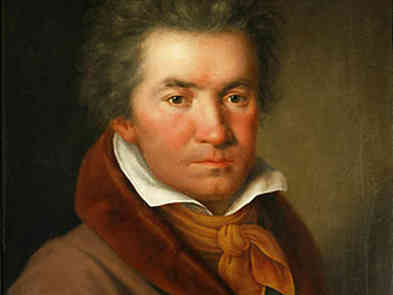
The Third Period: Transcendent
There is a door between you and God.
It is the shape of you on your knees.
-Jelaluddin Rumi
By 1811, Beethoven had given up conducting and performing because of his deafness. That year is most likely also the year of the famous "Immortal Beloved" letters. In 1812--frustrated, no doubt by the pain of his own lost love-- he began a vicious attack on his brother Kaspar's bride, Johanna, trying to prevent the marriage. While no blushing and virtuous virgin, Johanna hardly seems to have deserved the intense hatred with which she was assailed. culminating in a horrific custody battle for her child in 1815 after Kaspar's passing. While Beethoven won the lawsuit, he lost the war. The trial cost him all of his creative energy for several years and led to social humiliation. He was also incapable of providing the kind of home a child needs and ultimately, Karl attempted suicide. The end result, musically, is that it is a very different man who writes the music of the so-called Late or Transcendent period. Humbled and broken, not by fate but by his own personal failure, this is music that comes from the depth of being completely shattered.
These works almost all of which are in the small and intimate forms of piano sonatas and quartets, are defined by two striking elements: the intense fervor to unify and unite opposites and movements of sublime surrender.
They achieve a new unity and in some cases, present threads and motifs that weave through other works as well
Piano Sonata Op. 109 in E Major
Piano Sonata, Op 110 in Ab Major
Bagatelle in C Major
String Quartet Op. 130
String Quartet Op. 132
Often, tragedy and loss often are the alchemical catalyst for deeper layers of beauty. If Beethoven’s hearing had remained intact and he had his amorous advanced welcomed, I am certain we would have no 9th symphony, no Ode to Joy, no great Piano Sonatas. I think of this every time I listen to Beethoven’s String Quartet in A Minor, Op. 132.
Written by Beethoven after a life-threatening illness when he was utterly deaf, the middle movement bears the unwieldy title, "Heiliger Dankgesang eines Genesenen an die Gottheit, in der lydischen Tonart" (A Holy Song of Thanksgiving of a Convalescent to the Deity, in the Lydian Mode ) In it, we hear both the tenderness that comes from complete surrender in the midst of illness, and the joyous stirrings of new life and the vision of the possibilities of transcendent joy
It is a piece which inspired the following poem- my own humble offering for Thanksgiving last year.
A Blessing for Thanksgiving, written after Beethoven
by Kayleen Asbo
May I have the eyes to see
The sacred ordinary miracles that weave their web of light
Around each darkening day:
The dappled dew-dropped leaves that decorate each dawn,
The shimmering sunrise on the glistening grass,
The symphony of birdsong that greets each new morn
And the owl's lament as the moon rises and sets.
May I be mindful of all the graces I did not deserve
and yet fell upon my thirsty soul:
For the beauty that ran to embrace my hurried, harried eyes and ears,
For the kindness of strangers that softened the shadows of sorrow,
For the loyalty of friends who saw my need and wordlessly offered
their tender touch,
For the courage that Beethoven kindles across the centuries
As he shows us the way
To compose a life of hope in the midst of despair,
Joy in the midst of sorrow,
Love in the midst of loneliness.
No matter what may come,
May my soul, too, remember
To sing a song of Thanksgiving
Until my last, grateful breath.
Click here to listen to Beethoven's song-- perfect for this season of gratitude.
Contact Kayleen Asbo: [email protected]